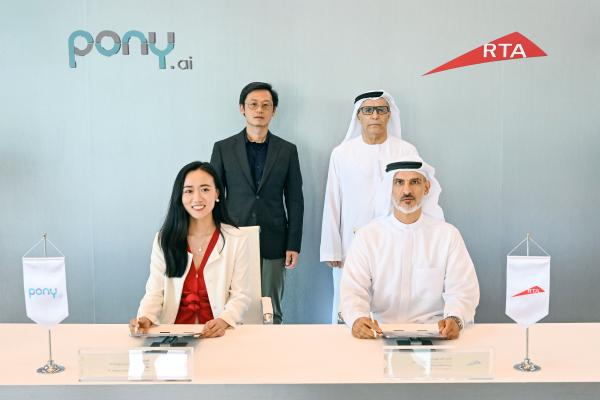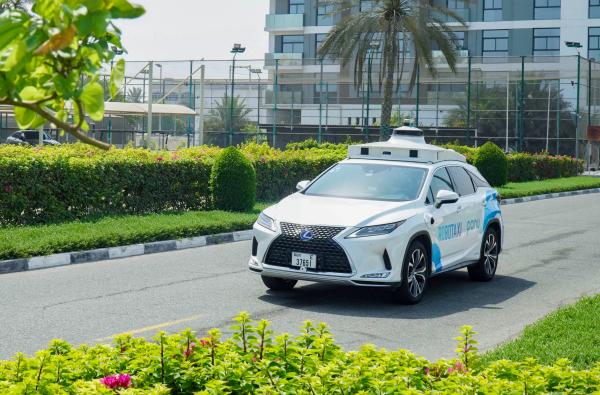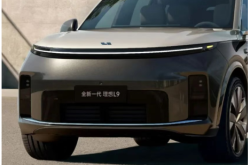Pony.ai Triumphs in Dubai! Autonomous Driving Races Ahead, with "Luobo" Speeding into the Future
![]() 07/08 2025
07/08 2025
![]() 422
422
On July 4th, local time, Pony.ai and the Dubai Roads and Transport Authority (RTA) signed a strategic cooperation agreement in Dubai, culminating in a Robotaxi launch ceremony.
The agreement, aimed at fostering the commercialization of autonomous Robotaxi services in Dubai, was jointly inked by Ahmed Hashim Bahrozyan, CEO of the RTA's Public Transport Agency, and Shi Yu, Vice President of Pony.ai.

(Image courtesy of Pony.ai)
According to the plan, Pony.ai's Robotaxi service will be rolled out in Dubai in phases, with the initial batch of vehicles set to commence road testing in 2025. These vehicles will seamlessly integrate into Dubai's comprehensive transportation network, encompassing metro, trams, and maritime routes. Dubai, as an innovation hub in the Middle East and a concentration of high-tech, will serve as a model for Robotaxi commercialization in surrounding regions.
From a travel scenario perspective, Robotaxi currently caters to short-distance transfers between different modes of transportation, presenting a relatively rigid travel scenario.
Recently, Luochao Channel reported that Pony.ai's seventh-generation Robotaxi debuted at the 2025 International Automobile and Supply Chain Expo held at AsiaWorld-Expo in Hong Kong. This indicates that the autonomous driving company is poised to enter the Hong Kong market.
Pony.ai's newly released seventh-generation Robotaxi boasts several significant advancements, including the use of 100% automotive-grade components and a focus on enhancing cost-effectiveness and cross-platform adaptability. The total cost of the autonomous driving suite has been reduced by 70%, employing 34 sensors such as 14 cameras, 4 millimeter-wave radars, and 9 lidars, capable of detecting objects and environments up to 650 meters away. Four NVIDIA Orin-X chips provide 1016 TOPS of computing power, with an official lifespan claim of 600,000 kilometers over 10 years.
Robotaxi services demand higher software and hardware redundancy and safety standards, often hindered by excessive mass production costs, which impede the formation of a scale effect. Thus, the iterative goal for many Robotaxi companies is to "reduce costs and increase efficiency." The introduction of new platforms and technologies has lowered production costs, gradually revealing the benefits of scale, positioning "Luobo" for global operations.

(Image courtesy of Pony.ai)
Beyond Dubai, Pony.ai is swiftly expanding into key markets in Asia, Europe, and the Middle East through collaborations with global partners to propel the adoption of autonomous driving services. For instance, it has partnered with the renowned transportation company Uber for road tests in Europe, collaborated with Emile Weber; in Asia, it has explored commercial operations in Singapore with ComfortDelGro; and in Seoul, South Korea, Pony.ai commenced road tests earlier this year.
Resolving the mass production challenge for Robotaxi equates to half the battle won for autonomous driving companies in their commercialization journey. The next step involves consistently establishing partnerships and conducting local adaptations based on traffic conditions in diverse regions, accelerating deployment and volume, thereby laying a solid foundation for Robotaxi commercialization.
Evidently, Robotaxi is not a product or service confined to a single market. Instead, it necessitates a scale effect that surpasses that of a conventional automotive product. This underscores the necessity for autonomous driving companies to continually advance their global operations. The "Luobo" race has reached a stage nearing large-scale commercialization, with the next norm being competition in fleet size, autonomous driving test miles, and market expansion. We may soon witness new milestones from Pony.ai in market exploration.







